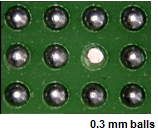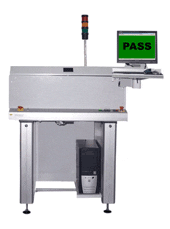What Is ScanINSPECT BPI?
ScanINSPECT BPI provides a fast, simple and user-friendly alternative to inaccurate and time-consuming manual inspection methods or expensive, yet slow, measurement systems.
ScanINSPECT BPI uses an intuitive process flow interface integrated with a high resolution, Color, 2-D image-processing unit. This combination allows 100% inspection of ball or bump placement on a wide variety of substrates and device types including FR4, Ceramic, Wafer, Flip chip, BGA, CSP, etc. The system can be used either pre or post reflow.

How Does ScanINSPECT BPI Work?
ScanINSPECT’s integration within the production environment provides inspection of ball or bump:
- Presence/Absence
- Size
- Position
Each device or substrate is placed into ScanINSPECT for 100% inspection. The balls or bumps are inspected and any errors are displayed on the screen. The system is barcode reader compatible.
Fast & Simple Programming
ScanINSPECT BPI is quickly programmed from a golden part in a few minutes. Corrections to the golden part can be quickly and easily made, if necessary.
Increased Yield & Improved Overall Equipment Efficiency
ScanINSPECT Ball Placement Inspection (BPI) is a powerful 100% inspection process control tool which increases product yield by ensuring accurate ball or bump placement. Missing balls or bumps can result in reduced yield, lost production time and extensive rework.
Missing or misplaced balls or bumps are now automatically detected. Problems are identified and eliminated before substrates or devices are reflowed, permitting quick and easy rework.
Simplicity
SScanINSPECT BPI set up is fast and easy. In production, each device or substrate is placed on the table, shuttled in, automatically aligned and checked for accuracy with a PASS or FAIL inspection in seconds.

Why Use ScanINSPECT BPI?
- Mandatory: 100% automatic inspection of ball or bump placement, pre and/or post reflow.
- Security: Confirm ball/bump absence / presence.
- Traceability: Full inspection documentation of every ball down to the device serial number & lot number level.
- Necessity: Detect errors before reflow permitting easy rework.

Technical Specifications*
System Specifications*
- Maximum Board Size: 18″ X 20″ (457mm X 508mm)**
- Minimum Board Size: 2″ x 2″ (50mm x 50mm)
- Maximum Inspection Area: 16.5″ X 20″ (419mm X 508mm)
- Scanning Resolutions range from 200 to 2400 dpi
- SMEMA Interface
- CE Certified
** XL size conveyor
Requirements
- Power Supply: 230V / 50 Hz or 110V / 60 Hz (jumper selectable)
- Power input: 0,75kW
Footprint of Inspection Unit
- Length: 41.7″ (1060mm)
- Width: 42.9″ (1089mm)
- Height: 57″ (1450mm) excluding light tower
- Weight: 330lbs. (150kg)
Computer*
- Multi Core Processing – 3 GHz
- 1 TB 7200 RPM HD, 8 – 16 GB RAM
- CD/DVD ROM – for archive purposes
- Flat Panel Monitor (17” or larger)
- Ethernet connection
- Win 10 – 64-Bit
- 2 available USB ports – USB2 OR USB3
*Recommended customer-supplied minimum PC requirements.
The following are trademarks of the indicated companies: ScanFAB™ is a trademark of ScanCAD International, Inc. *All specifications and designs subject to change without notice.*
Friendly, Flexible, Innovative & Global
ScanCAD International, Inc. continues to flourish and evolve to successfully meet ever-changing technology requirements.
All ScanCAD products were developed at the request of its customers, therefore your comments and suggestions are welcome.
